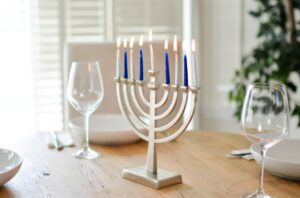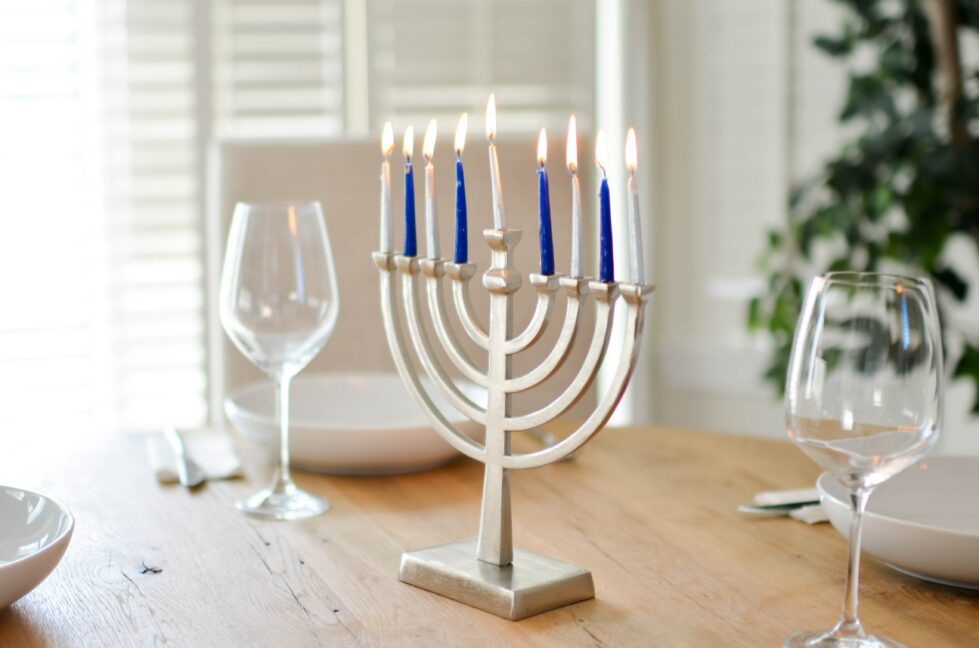

Hanukkah began on Thursday celebrating the Festival of Lights in the Jewish faith (Photo courtesy of Element 5 Unsplash Media)
The first day of Hanukkah began on December 7, celebrating what is also known as the Festival of Lights in the Jewish faith. Although this holiday is considered a rabbinic holiday, according to Rabbi Sholom Vogel of Chabad of Southern Delaware, which means it has fewer restrictions than other holidays in the faith, like Passover or Sukkot, it is one with specific traditions that have lasted for centuries.
“Hanukkah is a holiday commemorating two things. The story of Hanukkah takes place in during the Second Temple era around 300 BC, if I’m not mistaken,” Vogel said. “The Jewish people were under Greek rule. And at that time, there was a lot of the Hellenistic movement, so anti-Semitism was pervasive in the entire culture. And that was seeping into the Jewish customs as well. Many Jews were, unfortunately getting trapped into that. And there was a lot of oppressive rules and restrictions by the Greek Empire over the Jewish people, forbidding them from doing certain commandments that they had, which they did not approve of, and there’s much to be discussed as to which commandments were they not happy with and what was the reason?”
Many of the rules established by the Greeks didn’t make much sense, such as telling Jewish people who keep the Sabbath as a day of rest that they could have the day of rest, but it may be any day during the week, not the Sabbath day the faith required. One of the most oppressive rules established was that when a Jewish girl was to marry, the army would be permitted to “inaugurate” the woman before she was allowed to marry.
“It came a point where there was the head of the Maccabees, the Hasmonean Dynasty, so the father, it was his daughter that was getting married, and this general was coming to do what he does, and the father having none of it and the general ended up being killed,” Vogel said. “And that is what provoked the Maccabee revolt. The Hasmonean people created a revolt, and their followers were called the Maccabees, which is an acronym of Matityahu haKohen ben Yochanan. Essentially, it’s Hebrew for “but who is mighty in the strength of God?”
During the battle the Jewish temple was overtaken, but the Macabees were able to eventually take the temple back. The day that battle was won is the first day of Hanukkah as the Jewish people could then serve. God the way they wanted in the temple.
“Now, the issue was one of the main commandments or rituals that you do in the temples, you light a candelabra every single day, a menorah and this menorah needed special olive oil in order to be lit. In Judaism, we have spiritual impurities and when something becomes impure, it cannot be used for a whole new purpose. So, we need a specific type of oil, that would be found in a clay jug, sealed with a seal of the high priest and that was a way of showing that this is intact pure oil that you can use for the menorah,” Vogel said. “After taking back the temple, we couldn’t find any such oil until eventually they found one small jug of oil which when used, there would be enough to light the menorah for one day. Now the issue is it takes another seven days to go to the fields, to reap the olives, press them, filter it and then bring back more oil. That’s a seven day process. So, the issue is we only have a little bit of oil, what are we going to do? We can leave the temple now but then we still have too low of an amount of oil, and we may not be able to fulfill this commandment or to practice this ritual.”
The decision was made to use the oil and light the menorah for one day and figure out what to do the next day when the oil ran out. The miracle, however, was that the oil, that should only have lasted one day, actually lasted for eight. Vogel explained that the miracle did not end the war, which lasted for many years after that, but it demonstrated that God wanted the temple used to serve Him.
“Today, most people celebrate by lighting their own menorah inside their own homes. Every Jewish family has their own menorah or should have their own menorah. If they don’t have their own, they can reach out to me and I can provide it for them. And we light the candles on day one. So, the first night which is tonight, we will light one candle, tomorrow night before our Sabbath light two candles, Saturday night, three candles and so on, until the eighth night,” Vogel said. “That’s how we actually practice it and then customs have come along the way. Remember, this story incorporated oil so now to remember that in a fun way that keeps it going, we eat foods that are associated with oil so that’s why you’re gonna have lots of latkes, which are potato pancakes but fried and oil. We have donuts which are fried in oil. You have different food items which are fried, and we also have a custom to have cheesy foods as well because there was a different story that took place that it was associated there was cheese took a role in that story. So that’s foods and then there’s a little game called the dreidel game.”
Even the dreidel game is steeped in legend, according to Vogel.
“The dreidel is a spinning top and the story behind it, allegedly, and I’m saying allegedly because I know people debated this and so I can just say what I have heard started the tradition. One of the rules that they did not allow was for us to study our Torah. But a Jew can’t live without studying the Torah. So, we weren’t just gonna sit back and do nothing. So we hid in caves,” Vogel said. “And we had a teacher who gathered a couple of students and taught them Torah from the scrolls. Now the issue is the Greeks wouldn’t just make a rule, as I said, they would look to enforce it so we would be on the lookout. Anytime that they would come into the cave, that tradition tells us that they would hide the scrolls and take out the spinning tops to pretend as if we’re playing a game.”
Vogel explained that written on the four sides of the dreidel are four letters in Hebrew, the Nun the Gimel, the Hey and the Shin. Those four letters all are the beginning of a different word meaning Nes Gadol Haya Sham which translates to “a great miracle happened there.”.
“So, it is just a fun way of just keeping it alive and remembering the miracles,” Vogel said. “It is a way we can continuously think and praise God for all the miracles that he has done and for the miracles that he continues to do.”
The traditions of Hanukkah have not changed much over the years, according to Vogel.
“The menorahs are the same. The dreidels are the same. I would say traditionally everything’s been the same,” Vogel said. “Have people incorporated other fun things in their own way to modernize it, to adapt it, I’m sure but I don’t know, but for most, the menorah, the food they eat, the dreidel is all the same.”
Chabad of Southern Delaware holds special services during Hanukkah. Although they read the Torah every day at the synagogue and on Sabbath, they also read it on Monday, Thursday and holidays. Because Hanukkah begins on Thursday, special readings were planned. Vogel also stated that they add special prayers in their daily prayers, including a special prayer of things and praising God.
Chabad Southern Delaware is located at 17032 Minos Conaway Road in Lewes. They can be reached by calling 302-377-1162 or email at [email protected].
Share this Post


